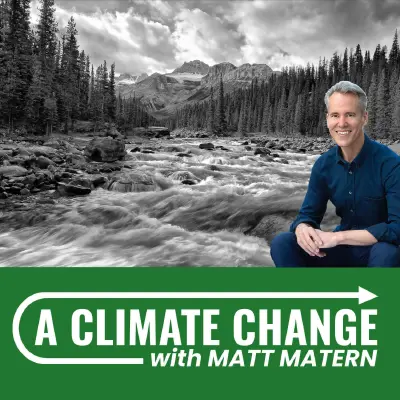
A Climate Change with Matt Matern
190 episodes Last Updated: May 08, 25
A Climate Change with Matt Matern is a weekly show featuring influential guests from government, business, activism, academia, and culture. The show serves to inform its audience with a focus on environmental and climate issues. Join us as we commit to making "a climate change." Similar to these great podcasts: TED Climate, Reversing Climate Change, Climate One, My Climate Journey, Volts, America Adapts, & A Matter Of Degrees.
Episodes
Climate change is no laughing matter. But laughing about it can actually help push the needle of climate action forward in unexpected ways. Comedian and educator Esteban Jorge Gast helps unpack how humor can make climate action more accessible and impactful. Tracing his journey from teaching to stand-up, Esteban shares how he uses laughter to break down complex climate issues, build diverse coalitions through initiatives like Climate Comedy Cohort, and challenge political narratives.
The circular economy could be the biggest climate solution we're ignoring. So... what’s the holdup? In this episode, Elin Bergman, Executive Director of Cradlenet Sweden and Co-Founder of the Nordic Circular Hotspot, shares how the circular economy could mitigate 40-70% of global carbon emissions. We also discuss fast fashion, e-waste, and AI’s hidden environmental costs.
If you want to help us reach our goal of planting 30k trees AND get a free tree planted in your name, visit www.aclimatechange.com/trees to learn how.
Can the communication channels of today be used to serve the fight against climate change, rather than deter it? In our latest episode, we explore the climate action movement with Kamila Camilo, Founder of Creators Academy Brazil. She shares how content creators are being mobilized to share positive environmental stories, the grassroots initiatives empowering indigenous communities through the digital economy, and why hope-based climate communication is more effective than fear. If you want to help us reach our goal of planting 30k trees AND get a free tree planted in your name, visit www.aclimatechange.com/trees to learn how.
What if climate anxiety could be the fire that sparks climate action? Dr. Charlie Gardner believes that it can. The conservation scientist and professor at the Durrell Institute of Conservation and Ecology joins us for a critical conversation on the importance of environmental activism, in whatever shape or form, on part of scientists and academicians in the fight against the climate crisis. This episode of A Climate Change serves as a much-needed reminder that actions will always speak louder than words.
Could waste from one industry become the climate solution for another? Madison Savilow, Director of Corporate and External Affairs, Carbon Upcycling, joins us for a deep dive into the world of carbon capture - its potential, the why and how, and how it is revolutionizing the world of construction, and thereby, environmental protection.
Diego Saez Gil, the Founder and CEO of Pachama, joins us to explore how AI and satellite technology are revolutionizing forest conservation and carbon credit verification. Diego shares insights on partnering with tech giants, working with indigenous communities, and leveraging AI to protect nature.
Zanagee Artis, Fossil Fuels Policy Advocate at NRDC and co-founder of Zero Hour joins us to discuss the urgent fight for ocean conservation and climate justice. We dive into how young activists shape climate policy, the battle against offshore drilling, and the promise of offshore wind energy. Zanagee shares his journey from youth organizer to national advocate and why the next two years are critical for climate action.
Dr. Gavin Schmidt, Director of NASA’s Goddard Institute for Space Studies, joins us for a deep dive into climate science, climate modeling, and the future of sustainable civilization. Gavin shares insights on the Arctic's rapid warming, machine learning's role in climate predictions, and the impact of methane emissions. We also explore how climate science intersects with astrobiology and the search for extraterrestrial civilizations.
Paul Hawken, renowned environmentalist and bestselling author, joins us to explore a revolutionary approach to climate action—one rooted in regeneration, not reduction. He challenges conventional climate narratives, critiques the shortcomings of net-zero goals and carbon credits, and explains why language shapes our relationship with nature. Hawken also reveals how his latest book, Carbon: The Book of Life, reimagines our connection to the living world.
Heather McTeer Toney, environmental justice leader, former mayor of Greenville, MS, and Executive Director of Bloomberg Philanthropies’ Beyond Petrochemicals campaign joins us to discuss the dangers of petrochemical expansion and the role of local activism in shaping national climate policy. She shares insights on environmental justice, community advocacy, and how pollution affects marginalized communities. She also explains key themes from her book, Before the Streetlights Come On, and how collective action can drive meaningful change in the fight for climate justice.
If you want to help us reach our goal of planting 30k trees AND get a free tree planted in your name, visit www.aclimatechange.com/trees to learn how.